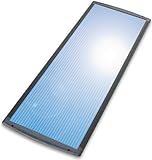Sunforce 50032 15 Watt Solar Battery Charger
- 15-watt solar charger plugs into your vehicle’s 12-volt lighter socket
- Works with automobile, all terrain vehicle (ATV), personal water craft (PWC), and boat batteries
- Made of durable ABS plastic and amorphous solar cells
- Manufacturer recommends using a charge controller (not included) in tandem with this charger for optimal results
- Measures 15.5 x 2.5 x 41.5 inches (WxHxD)
Product Description
The Sunforce 50032 15 Watt Solar Battery Charger gives you another reason to love the sun — it’ll help keep your vehicle’s battery charged. Just plug the this helpful 15-watt battery charger into your vehicle’s 12-volt lighter socket and position the panel to pick up the most daylight possible. And with the built-in blocking diode technology, this charger is designed to protect against battery discharge at night. You can also use this device to maintain the charge … More >>

Sunforce 50032 15 Watt Solar Battery Charger



I put this on top of a metal storage container with 3 LED lights inside. I put in a controller and a 12 volt deep cyle battery, and I have lots of light.
Just for grins I put in a 400 watt inverter in case anyone wanted to run a battery charger for a DeWalt cordless drill. Great job site problem solver.
Rating: 5 / 5
It was simple to install on top of my RV. I was able to put a cover over the panel and keep getting the sunlight to charge the batteries. It charges even through glass on the inside of the RV.
Rating: 4 / 5
I got a set of 5 panels for $65 each when I saw them on sale. I’ve had no problems (with arriving broken or such) & I’m pretty sure they put out the energy I expect when the sun’s on them. (Update 7-08, see my review under the northern tool panels for my performance test results of the panels I have).
But after I got these I ran some math on the cost for them and their output versus the utility power rate. With power billed in kiloWatt/hours (or 1,000 watts at a time) these panels can suposedly produce 15 watts (~1/60 of a kiloWatt). Assuming they give me the full 15 watts output for ~8 hours per day constantly, it’ll take 15+ years for them to pay for themselves. Since cloudy days & such reduce the output & benefit, it will likely make it take a lot longer. Whether of not the plastic construction will hold up that long I wonder about too, so I’m not sure it was really worth it now. How to fully utilize the power I get & not just be keeping a battery fully charged is another thing I’m not sure of (I don’t want to leave something running that drains the battery overnight, but not running anything means I get nothing out of it).
So if you want to power something in a remote location that can run off of minimal power or has a high draw but for only a minimal time, this may be the way to go. Just remember that the panels only give you power during sunshine and you need enough of them to be able to recharge the battery they feed during your daylight hours. The set of 4 panels & more for ~$300 sounds like a better deal than ~$100 each (unless you see these on sale). Also being able to use them with existing things (like in a RV that runs off of 12V power anyway) can make it easier to utilize them as well.
But if you are thinking buying these will help you save on your energy bill at home, you might want to think again. To produce 1 kilowatt of solar power will cost you ~$5,000 up front (and that’s almost regardless of who’s name brand you choose). To collect up the DC power they produce and convert that into household power requires a car size battery & a power inverter as additional costs. I saw a TV show where a guy in California made himself independent of utilities with a farm of panels & other equipment needed, but it cost him over $500,000 to put it all together. If you can afford such and like the comfort of being energy independent, go for it! Otherwise a utility bill as little as $0.10 for each kilowatt hour seems more cost effective to me.
Rating: 5 / 5